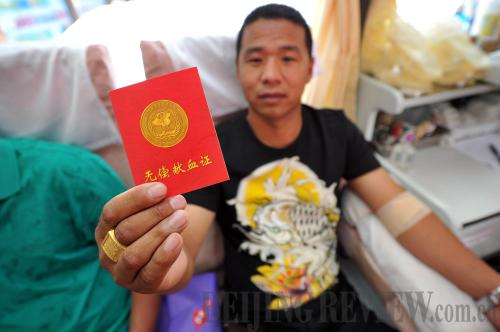|
 |
|
PROUD DONOR: A man shows his certificate for donating blood at a collection station in Yinchuan, Ningxia Hui Autonomous Region, on June 14, World Blood Donor Day (PENG ZHAOZHI) |
Education Campaign
Xi Jinping, General Secretary of the Communist Party of China (CPC) Central Committee, said on June 18 that the Party's upcoming year-long campaign will be a "thorough cleanup" of undesirable work styles such as formalism, bureaucratism, hedonism and extravagance.
The main task of the campaign focuses on building work styles to boost ties between CPC members and the people, Xi said at a high-profile deployment conference. The Political Bureau of the CPC Central Committee decided in April to launch the campaign in the latter half of the year.
The campaign will focus on CPC organs and officials at or above county level who will be required to reflect on their own practices and correct any misconduct.
Xi said that a long-term mechanism should be established to encourage Party members and officials to serve the people, be down-to-earth, upright and corruption-free as "the issue of improper work styles is prone to relapse and stubborn in nature."
The Party should take the campaign as an opportunity to introduce new rules, improve existing ones, and nullify outdated regulations, he said, vowing that no exception should be made when implementing the rules.
Healthcare Costs
The estimated total cost of healthcare services in China reached 2.89 trillion yuan ($473.5 billion) at the end of 2012, an 18.8-percent rise compared to the previous year, according to a statistics bulletin released on June 18 by the National Health and Family Planning Commission.
The country added 503,000 medical staff and 565,000 hospital beds in 2012, with respective totals having reached 9.12 million and 5.16 million. The number of outpatient visits in 2012 also increased by 9.9 percent.
However, relative cost of services is still lower than in other developing countries. China's total cost was only 5.15 percent of GDP in 2011, lower than that of Brazil (8.8 percent) and South Africa (9.2 percent).
Crimes Against Nature
China's highest judicial and procuratorial organs jointly issued a new judicial interpretation on June 18 imposing criminal punishments on polluters.
With more precise criteria for convictions and sentencing, the document, which took effect on June 19, is expected to facilitate the work of judges and tighten punishments for polluters.
The document lists 14 activities that will be considered "crimes of impairing the protection of the environment and resources."
Contaminating drinking water sources or nature reserves with radioactive, pathogenic or toxic waste is a crime. Activities that poison more than 30 people or force the evacuation of more than 5,000 are also designated as environmental crimes.
The interpretation considers pollution near hospitals, schools and residential areas serious offenses.
According to the country's Criminal Law, those convicted of such crimes will face a maximum prison term of seven years and be subjected to fines.
Military Recruitment
The military recruitment period in China has been moved and will now begin in August in a bid to attract more talented people, military sources said on June 14.
An online recruitment service run by the Ministry of National Defense is ready for applications, and recruiting procedures including physical examinations will begin on August 1.
Previously, recruitment began in October, and the change is the first in 23 years.
The Chinese military started recruiting college graduates in 2001. More than 130,000 People's Liberation Army soldiers were college graduates at the end of 2009.
To help the military recruit more students, the country's top legislature amended the Military Service Law in 2011, raising the maximum age for recruits to 24.
| 